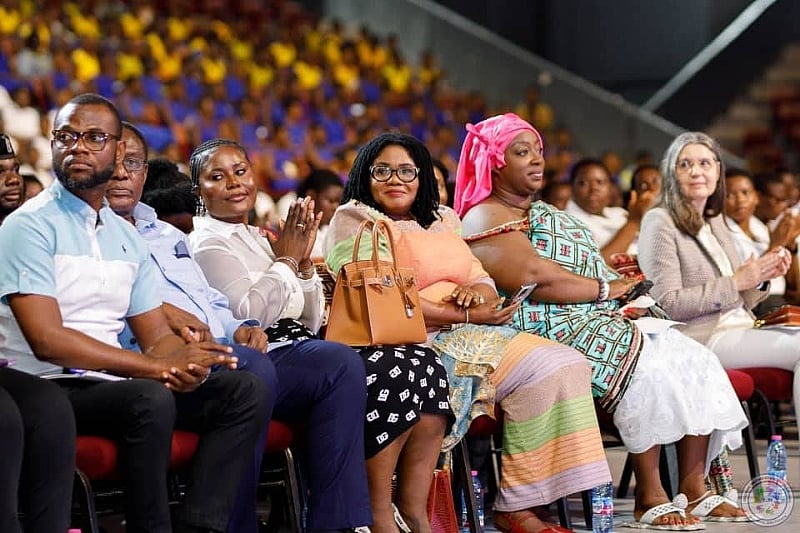Menstruation, a natural biological process integral to female reproductive health, has long been shrouded in stigma and silence, particularly in many cultural contexts. This societal hush-hush attitude often leads to misinformation, shame, and a lack of access to proper menstrual hygiene management, negatively impacting the physical and emotional well-being of girls and women. Ghana’s Minister for Gender, Children and Social Protection, Dr. Agnes Naa Momo Lartey, has taken a definitive stance against this silence, emphasizing the government’s commitment to breaking the stigma surrounding menstruation and ensuring access to menstrual hygiene resources. Speaking at an event organized by the Touching the Lives of Girls Foundation International, Dr. Lartey highlighted the importance of open dialogue and education to normalize menstruation and empower girls to manage their periods with confidence and dignity.
Dr. Lartey’s address underscored a multifaceted approach to addressing the challenges associated with menstrual hygiene. She acknowledged the collaborative efforts between the Ministry, UNICEF, the Ghana Education Service, and other partners to improve menstrual hygiene management in the country. A significant stride in this direction is the recent launch of the National Sanitary Pad Distribution Program, an initiative aimed at providing free sanitary pads to two million schoolgirls. This program addresses a critical barrier to menstrual hygiene: affordability. By providing free access to sanitary products, the government is working towards ensuring that no girl is forced to miss school or compromise her hygiene due to financial constraints. This initiative has the potential to improve school attendance rates, enhance girls’ educational outcomes, and ultimately contribute to their overall empowerment.
The theme of the event, “Breaking the Silence,” reflects the urgent need to address not only menstrual hygiene but also the pervasive issue of sexual abuse. Dr. Lartey emphasized the importance of awareness and accountability in combating this societal ill. Silence often protects perpetrators and leaves victims feeling isolated and vulnerable. By encouraging open conversations about sexual abuse, fostering a culture of reporting, and ensuring access to support services, communities can create safer environments for children and young people. This commitment to safeguarding children’s well-being aligns with the broader mission of the Ministry of Gender, Children, and Social Protection to protect vulnerable populations and promote their rights.
Beyond menstrual hygiene and child protection, Dr. Lartey’s address also touched upon the significant role of financial literacy in youth empowerment. She stressed the importance of equipping young people with the knowledge and skills to make informed financial decisions. Financial literacy empowers individuals to manage their resources effectively, plan for their future, and contribute meaningfully to national development. By encouraging financial responsibility and entrepreneurial thinking among youth, the government aims to foster economic independence and create a generation of financially savvy citizens. This focus on financial literacy complements efforts to promote education and skills development, creating a holistic approach to youth empowerment.
To further support girls, children, and young people, Dr. Lartey highlighted the availability of various support platforms, including the Orange Support Centre, the Boame App, and toll-free helplines. These resources provide confidential channels for individuals to seek assistance, report abuse, and access vital information related to gender-based violence, child protection, and other relevant issues. These platforms underscore the government’s commitment to providing accessible and responsive support services to vulnerable populations. The integration of technology, such as the Boame App, demonstrates a forward-thinking approach to reaching individuals and ensuring that help is available when and where it is needed.
In conclusion, Dr. Lartey’s address painted a comprehensive picture of the government’s commitment to empowering girls, protecting children, and equipping young people with the tools they need to thrive. By breaking the silence surrounding menstruation, promoting access to menstrual hygiene resources, tackling the issue of sexual abuse, and emphasizing financial literacy, the government is laying the groundwork for a more equitable and prosperous future for all Ghanaians. The message is clear: no girl should be left behind because of her period, no child should suffer in silence, and every young person deserves the opportunity to achieve their full potential. The availability of support platforms further reinforces this commitment, ensuring that individuals have access to the resources and assistance they need to navigate challenges and build a brighter future.


